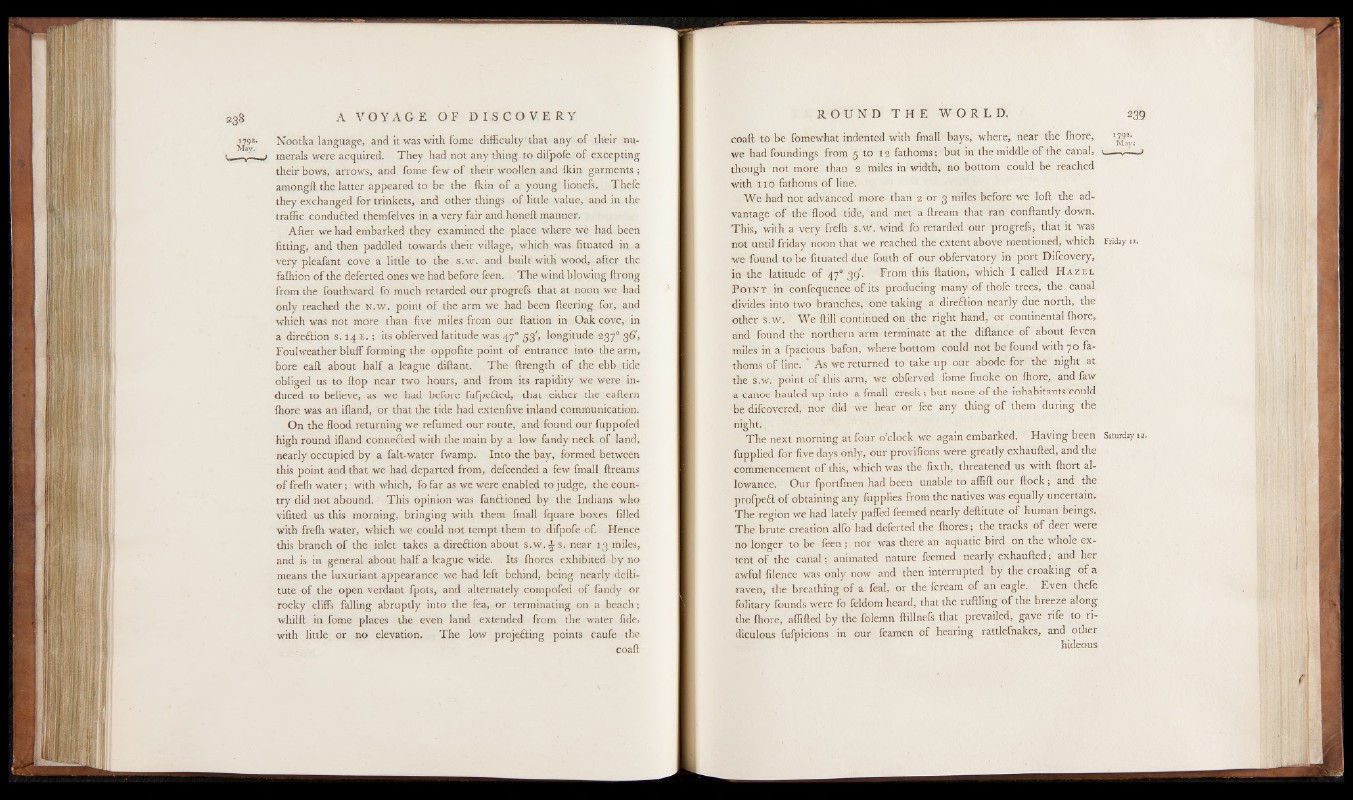
238 A V O Y A G E O F D I S C O V E R Y
l 792- Nootka language, and it was with fome difficulty that any o f their nu-
■ i merals were acquired. They had not any thing to difpofe of excepting
their bows, arrows, and Tome few o f their woollen and Ikin garments ;
amongft the latter appeared to be the Ikin o f a young lionefs. Thefe
they exchanged for trinkets, and other things of little value, and in the
traffic condufted themfelves in a very fair and honeft manner.
After we had embarked they examined the place where we had been
fitting, and then paddled towards their village, which was fituated in a
vefy pleafant cove a little to the s.w. and built with wood, after the
faffiion o f the deferted ones we had before feen. The wind blowing ftrong
from the fouthward fo much retarded our progrefs that at noon we had
only reached the N .w . point o f the arm we had been fleering for, and
which was not more than five miles from our fiation in Oak cove, in
a direftion s. 14 E . ; its obferved latitude was 470 53', longitude 237° 36',
Foulweather bluff forming the oppofite point o f entrance into the arm,
bore eaft about half a league diftant. The ftrength o f the ebb tide
obliged us to flop near two hours, and from its rapidity we were induced
to believe, as we had before fufpected, that either the eaftern
ftore was an ifland, or that the tide had extenfive inland communication.
On the flood returning we refumed our route, and found our fuppofed
high round ifland connefted with the main by a low fandy neck of land,
nearly occupied by a falt-water fwamp. Into the bay, formed between
this point and that we had departed from, defcended a few fmall ftreams
o f frefh water; with which, fofar as we were enabled to judge, the country
did not abound. This opinion was fanftioned by the Indians who
vilited us this morning, bringing with them fmall fquare boxes filled
with frelh water, which we could not tempt them to difpofe of. Hence
this branch of the inlet takes a direftion about s .w . i s . near 13 miles,
and is in general about half a league wide. Its Chores exhibited by no
means the luxuriant appearance we had left behind, being nearly defti-
tute of the open verdant fpots, and alternately compofed of fandy or
rocky cliffs falling abruptly into the fea, or terminating on a beach;
whilft in fome places the even land extended from the water fide,
with little or no elevation. The low projecting points caufe the
coaft
coaft to be fomewhat indented with fmall bays, where, near the fliore,
we had foundings from 5 to 12 fathoms; but in the middle of the canal, i_ — >
though not more than 2 miles in width, no bottom could be reached
with 110 fathoms of line.
We had not advanced more than 2 or 3 miles before we loft the advantage
of the flood tide, and met a ftream that ran conftantly down.
This, with a very frelh s.w. wind fo retarded our progrefs, that it was
not until friday noon that we reached the extent above mentioned, which Friday n .
we found to be fituated due fouth of our obfervatory in port Difcovery,
in the latitude of 470 39'. From this ftation, which I called H a z e l
P o i n t in confequence o f its producing many of thofe trees, the canal
divides into two branches, one taking a direftion nearly due north, the
other s.w. We ftill continued on the right hand, or continental ffiore,
and found the northern arm terminate at the diftance of about feven
miles in a fpacious bafon, where bottom could not be found with 70 fathoms
of line. * As we returned to take up our abode for the night at
the s.w. point of this arm, we obferved fome fmoke on ffiore, and faw
a canoe hauled up into a fmall creek ; but none of the inhabitants could
be difcovered, nor did we hear or fee any thing of them during the
night.,
The next morning at four o’clock we again embarked. Having been Saturday 12.
fupplied for five days only, our provifions were greatly exhaufted, and the
commencement of this, which was the fixth, threatened us with ffiort allowance.
Our fportfmen had been unable to aflift our ftock ; and the
profpeCt of obtaining any fupplies from the natives was equally uncertain.
The region we had lately paffed feemed nearly deftitute o f human beings.
The brute creation alfo bad deferted the ffiores; the tracks o f deer were
no longer to be feen ; nor was there an aquatic bird on the whole extent
of the canal; animated nature feemed nearly exhaufted; and her
awful filence was only now and then interrupted by the croaking o f a
raven, the breathing of a leal, or the fcream of an eagle. Even thele
folitary founds were fo feldom heard, that the ruffling of the breeze along
the ffiore, affifted by the folemn ftillnefs that prevailed, gave rife to ridiculous
fufpicions in our feamen of hearing rattlefnakes, and other
hideous